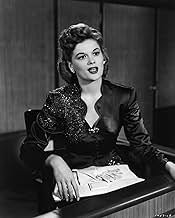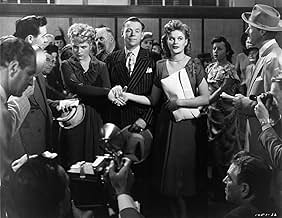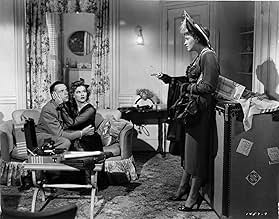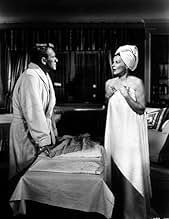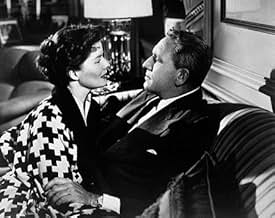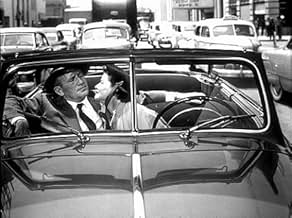AVALIAÇÃO DA IMDb
7,4/10
24 mil
SUA AVALIAÇÃO
O caso de uma esposa que atira no marido e na amante divide um casal de advogados, ele do lado da acusação, ela da defesa.O caso de uma esposa que atira no marido e na amante divide um casal de advogados, ele do lado da acusação, ela da defesa.O caso de uma esposa que atira no marido e na amante divide um casal de advogados, ele do lado da acusação, ela da defesa.
- Direção
- Roteiristas
- Artistas
- Indicado a 1 Oscar
- 3 vitórias e 5 indicações no total
Edward Andrews
- Kip's neighbor
- (não creditado)
Bonnie Bannon
- Woman in Courtroom
- (não creditado)
Charles Bastin
- Young District Attorney
- (não creditado)
Harry Baum
- Commuter
- (não creditado)
Joseph E. Bernard
- Mr. Bonner - Adam's Father
- (não creditado)
- Direção
- Roteiristas
- Elenco e equipe completos
- Produção, bilheteria e muito mais no IMDbPro
Avaliações em destaque
Not as dramatic, engaging or funny as has been suggested but the lead pair make it well worth seeing
Adam and Amanda Bonner are happily married, despite the sparky nature of their relationship. Lawyers each, both are interested in a newspaper report of a woman who shot (but not killed) her husband when she discovered him in the arms of another woman. The Bonner's take differing views of the case and it is no surprise that Adam ends up prosecuting while Amanda is Doris Attinger's defence counsel. With the gloves off in the courtroom with a legal battle of sexual equality, it is no surprise that the conflict and disagreements don't end at the front door and soon it is all kicking off.
The issue of sexual equality may have moved on from where it was in the middle of the last century but this film occasionally hits an interesting point, even if the majority of it is fairly shallow and a bit unconvincing in terms of legal argument. Without really engaging me, the film still held my interest as the story developed and it was fairly enjoyable even if it couldn't settle on whether or not it is a comedy or a courtroom "issue" drama; as it was I didn't think it did either brilliantly but did both well enough to make it work. I did expect more laughs because I thought it was going to be one of the screwball genre, but once I realised that it was more amusing than funny then I was able to settle into it.
One of the main reasons that the film has continued to last down the years is the chemistry between Tracy and Hepburn. Both are convincing as a couple in terms of romance, attrition, chemistry and other aspects of their relationship on screen. Tracy is tetchy and enjoyable but Hepburn is more than a match for him and she does it with style and real humour. Support is good from Holliday as well as Wayne's annoying neighbour. Mainly though it is Tracy and Hepburn's movie and they more than carry it between them.
Overall though this is not quite the classic that I had hoped it would be but it still did enough to make it work today. The courtroom stuff is not as dramatic or as relevant as it may have once been and the comedy is more of the sharp variety than the laugh-out-loud sort; however the chemistry between the lead two keeps it going and makes it worth seeing still.
The issue of sexual equality may have moved on from where it was in the middle of the last century but this film occasionally hits an interesting point, even if the majority of it is fairly shallow and a bit unconvincing in terms of legal argument. Without really engaging me, the film still held my interest as the story developed and it was fairly enjoyable even if it couldn't settle on whether or not it is a comedy or a courtroom "issue" drama; as it was I didn't think it did either brilliantly but did both well enough to make it work. I did expect more laughs because I thought it was going to be one of the screwball genre, but once I realised that it was more amusing than funny then I was able to settle into it.
One of the main reasons that the film has continued to last down the years is the chemistry between Tracy and Hepburn. Both are convincing as a couple in terms of romance, attrition, chemistry and other aspects of their relationship on screen. Tracy is tetchy and enjoyable but Hepburn is more than a match for him and she does it with style and real humour. Support is good from Holliday as well as Wayne's annoying neighbour. Mainly though it is Tracy and Hepburn's movie and they more than carry it between them.
Overall though this is not quite the classic that I had hoped it would be but it still did enough to make it work today. The courtroom stuff is not as dramatic or as relevant as it may have once been and the comedy is more of the sharp variety than the laugh-out-loud sort; however the chemistry between the lead two keeps it going and makes it worth seeing still.
Adam's Rib (George Cukor, 1949) is often hailed as the best "battle-of-the-sexes" comedy on celluloid, but it's beset with the same problems as the bulk of these Tracy-Hepburn vehicles: dated social observation that's tricky to navigate today, a lack of laughs and dramatic sequences that are just too heavy. The leads are a blissfully married couple who clash when they take opposing sides in a murder trial: assistant DA Spence leads the prosecution of wronged wife Judy Holliday (who is magnificent), while crusading feminist Kate leaps to her defence. Holliday plugged philandering husband Tom Ewell, you see, then fired wildly around the flinching floozy he was nuzzling up to, Jean Hagen.
The acting is absolutely stunning - universally superb - and there's smart use of newspaper inserts and a puppet show motif, but the material is spotty and chunky, with humour arriving in slabs rather than being weaved through the narrative. Kudos to former stage star David Wayne (he played Og in the smash Broadway version of Finian's Rainbow) for being so formidably irritating as Hepburn's extremely camp confidante and suitor. His reading of Cole Porter's specially adapted song Farewell, Amanda is a rare moment of respite in a teeming sea of annoyance. Hepburn asked her favourite director, Cukor, to favour Holliday in the filming of their scenes and leaked stories to the press about Judy's revelatory performance enraging both the leads. The ploy was designed to land her apprentice the lead in the screen adaptation of Born Yesterday, which she had initiated on stage. It worked - and she took home the Best Actress Oscar the following year.
As for Adam's Rib, it's impressive and memorable but, despite all that, resolutely not a classic.
The acting is absolutely stunning - universally superb - and there's smart use of newspaper inserts and a puppet show motif, but the material is spotty and chunky, with humour arriving in slabs rather than being weaved through the narrative. Kudos to former stage star David Wayne (he played Og in the smash Broadway version of Finian's Rainbow) for being so formidably irritating as Hepburn's extremely camp confidante and suitor. His reading of Cole Porter's specially adapted song Farewell, Amanda is a rare moment of respite in a teeming sea of annoyance. Hepburn asked her favourite director, Cukor, to favour Holliday in the filming of their scenes and leaked stories to the press about Judy's revelatory performance enraging both the leads. The ploy was designed to land her apprentice the lead in the screen adaptation of Born Yesterday, which she had initiated on stage. It worked - and she took home the Best Actress Oscar the following year.
As for Adam's Rib, it's impressive and memorable but, despite all that, resolutely not a classic.
Sometimes in life, we experience the most embarrassing situations. But no matter how embarrassing these situations are, they can't possibly be as whacked-out as what the characters in "Adam's Rib" experience.
It all begins when Doris Attinger (Judy Holliday) shoots her husband Warren (Tom Ewell) after she finds him cheating on her. She is promptly arrested for attempted murder. High-priced lawyer Adam Bonner (Spencer Tracy) is assigned to represent Warren in court. However, Adam's wife Amanda (Katharine Hepburn) finds it despicable that a woman was arrested for punishing her unfaithful husband, and decides to represent Doris in court.
Well, as you can imagine, with husband and wife on opposite sides of the trial, things get a little crazy. It only makes sense that they can't help but maintain their spousal attitudes towards each other while in court (especially under the table). But even Amanda starts to find Adam unpleasant for defending Warren, and she plays a few tricks on him in court, namely with a very muscular woman.
One thing that you have to wonder after seeing a movie this good is: how did Ruth Gordon and Garson Kanin come up with such a great story? Well, the point is that they did. It focuses not only on sexism, but also on how the whole trial is affecting their marriage.
Anyway, the point is that in my opinion, "Adam's Rib" should have won Best Picture for 1949. Perfect.
It all begins when Doris Attinger (Judy Holliday) shoots her husband Warren (Tom Ewell) after she finds him cheating on her. She is promptly arrested for attempted murder. High-priced lawyer Adam Bonner (Spencer Tracy) is assigned to represent Warren in court. However, Adam's wife Amanda (Katharine Hepburn) finds it despicable that a woman was arrested for punishing her unfaithful husband, and decides to represent Doris in court.
Well, as you can imagine, with husband and wife on opposite sides of the trial, things get a little crazy. It only makes sense that they can't help but maintain their spousal attitudes towards each other while in court (especially under the table). But even Amanda starts to find Adam unpleasant for defending Warren, and she plays a few tricks on him in court, namely with a very muscular woman.
One thing that you have to wonder after seeing a movie this good is: how did Ruth Gordon and Garson Kanin come up with such a great story? Well, the point is that they did. It focuses not only on sexism, but also on how the whole trial is affecting their marriage.
Anyway, the point is that in my opinion, "Adam's Rib" should have won Best Picture for 1949. Perfect.
(Note: Over 500 of my movie reviews are now available in my book "Cut to the Chaise Lounge or I Can't Believe I Swallowed the Remote!" Get it at Amazon.)
Two New York lawyers, husband Adam Bonner (Spencer Tracy) and wife Amanda Bonner (Katharine Hepburn), work out the marital tension and fight the sexual wars in the courtroom on opposite sides of a wife (Judy Holliday) shoots cheating husband (Tom Ewell) case. Adam's masculinity is seemingly challenged and his sense of justice offended by his wife's insistence on showing how smart she is while furthering her feminist agenda at the expense of the law. Will their public confrontation destroy their marriage, or will it ultimately make the bond stronger?
This still plays mainly because of the charisma of Hepburn and Tracy and the fine chemistry they create together. The script by Garson Kanin and Ruth Gordon is shallow and profound by turns, yet ultimately witty and pleasing. Judy Holliday as the lower middle-class Doris Attinger (on her way to her signature role in Born Yesterday (1950)) and David Wayne, as the song-writing neighbor who adores Amanda, shine in supporting roles. George Cukor's direction is clear, crisp and always focused. In the end we can see that Adam can be as feminine as Amanda can be masculine. The bit where Tracy cries real tears to win her back and then tells her, "We all have our tricks" is classic. It's his clever answer to her outrageous courtroom theatrics. Memorable as it illuminates their contrasting personalities is the early scene where the unsophisticated Doris is interviewed by Yale law school grad Amanda.
As a political movie, was Adam's Rib ahead of its time as a vehicle for feminist expression, or was it just another apology for male chauvinism, or was it balanced and fair? I'll give you a hint: the title is ironic. One of the things that made the Tracy/Hepburn romance work so well for so long was the creative balance they maintained in the battle of the sexes. The script by Kanin and Gordon carefully continues that profoundly true equilibrium.
Two New York lawyers, husband Adam Bonner (Spencer Tracy) and wife Amanda Bonner (Katharine Hepburn), work out the marital tension and fight the sexual wars in the courtroom on opposite sides of a wife (Judy Holliday) shoots cheating husband (Tom Ewell) case. Adam's masculinity is seemingly challenged and his sense of justice offended by his wife's insistence on showing how smart she is while furthering her feminist agenda at the expense of the law. Will their public confrontation destroy their marriage, or will it ultimately make the bond stronger?
This still plays mainly because of the charisma of Hepburn and Tracy and the fine chemistry they create together. The script by Garson Kanin and Ruth Gordon is shallow and profound by turns, yet ultimately witty and pleasing. Judy Holliday as the lower middle-class Doris Attinger (on her way to her signature role in Born Yesterday (1950)) and David Wayne, as the song-writing neighbor who adores Amanda, shine in supporting roles. George Cukor's direction is clear, crisp and always focused. In the end we can see that Adam can be as feminine as Amanda can be masculine. The bit where Tracy cries real tears to win her back and then tells her, "We all have our tricks" is classic. It's his clever answer to her outrageous courtroom theatrics. Memorable as it illuminates their contrasting personalities is the early scene where the unsophisticated Doris is interviewed by Yale law school grad Amanda.
As a political movie, was Adam's Rib ahead of its time as a vehicle for feminist expression, or was it just another apology for male chauvinism, or was it balanced and fair? I'll give you a hint: the title is ironic. One of the things that made the Tracy/Hepburn romance work so well for so long was the creative balance they maintained in the battle of the sexes. The script by Kanin and Gordon carefully continues that profoundly true equilibrium.
Adam's Rib turned out to be a delightfully cheeky romp with a kicker sense of humour, all acted out with ease by Spencer Tracy & Katherine Hepburn. I love how the film veers from the courtroom right into their marital home and becomes not just about a battle of wills, but a battle of the sexes as well, much fun watching this famous couple go at each other, both at work and at home. The film benefits greatly from the appearance of the lovely Judy Holliday in her breakthrough role, and it amused me greatly to see David Wayne playing a shifty character as I remember him fondly from the Twilight Zone episode Escape Clause in 1959. 8/10
Você sabia?
- CuriosidadesInspired by the real-life story of husband-and-wife lawyers William Dwight Whitney and Dorothy Whitney, who represented Raymond Massey and his ex-wife Adrianne Allen in their divorce. After the Massey divorce was over, the Whitneys divorced each other and married the respective Masseys.
- Erros de gravaçãoDuring the trial proceedings, a Black juror was in the first row, but the trial scene following the argument between Amanda and Adam where Adam walks out of the home, the jury makeup has now changed and the Black juror is not present. However the following day when court resumes for the jury verdict, the Black juror is back in the jury box.
- Cenas durante ou pós-créditosOpening credits are little curtains that go up and down, on a stage in a performance hall.
- Versões alternativasAlso available in a computer colorized version.
- ConexõesEdited into Hollywood: The Dream Factory (1972)
- Trilhas sonorasFarewell, Amanda
(1949)
Music and Lyrics by Cole Porter
Played during the opening credits and often in the score
Sung by David Wayne (uncredited), accompanying himself on the piano
Reprised by the voice of Frank Sinatra (uncredited) on the radio
Whistled by Katharine Hepburn (uncredited)
Sung a cappella by Spencer Tracy (uncredited)
Principais escolhas
Faça login para avaliar e ver a lista de recomendações personalizadas
Detalhes
- Tempo de duração
- 1 h 41 min(101 min)
- Cor
- Proporção
- 1.37 : 1
Contribua para esta página
Sugerir uma alteração ou adicionar conteúdo ausente



